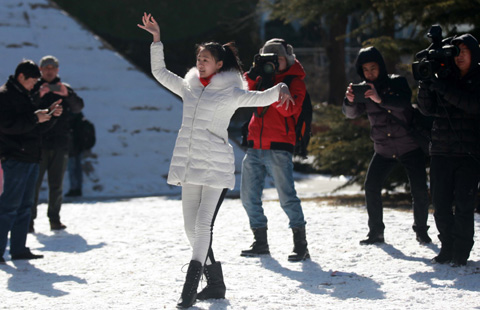Retirement age should be raised to 65: experts
Updated: 2014-02-09 23:57
By He Dan (China Daily)
|
||||||||
China should gradually increase the retirement age to 65 over the next 10 to 20 years for all workers, top social insurance experts have urged.
The average age of retirement in China is now about 53, while life expectancy is 75, said Wang Dewen, a social protection economist with the World Bank's Beijing office.
The gap is much wider than the 12 years he believes is a reasonable period for an individual to draw a pension.
"The current arrangement has placed huge pressure on the social security fund. It's not sustainable," he warned.
Wang is the leading author of a reform plan his organization proposed in September to the Ministry of Human Resources and Social Security, which is in charge of pensions.
The ministry invited seven institutions, including the World Bank and the International Labor Organization, to deliver proposals for its overall reform plan.
If the pension program remains unchanged, a financial deficit will emerge in 2030 and the accumulated shortage will account for about 90 percent of China's GDP in 2050, according to a report by the Chinese Academy of Social Sciences in late December.
"The World Bank suggests China gradually raise the retirement age over the next one or two decades, which will help to relieve at least a third of the future deficit for the social security fund," Wang said, adding that consensus has been reached on such an approach.
Chinese media have speculated whether the government will pilot the reforms among civil servants or blue-collar workers.
However, at a news conference in December, Hu Xiaoyi, vice-minister of human resources and social security, dismissed the prospect of initially targeting a particular group.
Wang said the reform should be rolled out nationwide.
Hu Aidi, a specialist on social security for the International Labor Organization, said there are other options for maintaining and improving the sustainability of a pension program in the face of an aging population, such as increasing contributions or reducing pensions.
"Increasing the retirement age is used more frequently from an international perspective," she said.
Online polls suggest that most Chinese netizens oppose raising the retirement age. Some raised concerns about the adequacy of pensions, while others say raising the retirement age will worsen employment prospects for young people entering the job market.
Wang urged the government to introduce a system to review and adjust the pension level periodically, taking into account changes in income or economic growth, inflation and living costs.
The mechanism will enable the public to have rational expectations concerning pensions and boost their support for the reform, he said.
The State Council said it will increase pensions by 10 percent, which have been a fixed rate for the past nine years.
"It's a random move rather than an established mechanism," Wang said. "The central government has not explained to the public how it reached the figure of 10 percent, and there are also questions about whether local governments can afford it."
Raising pension benefits has implications for financial sustainability in the long run, he said and stressed the importance of making policies based on economic and demographic assumptions that estimate future liabilities.
"The reality is the pension level has failed to match inflation, and workers' salaries have surged in recent years thanks to rapid economic growth," he added.
When asked whether raising the retirement age will lead to less jobs for younger people, Wang said studies in member states of the Organization for Economic Cooperation and Development show that raising the retirement age has little impact on the employment of younger people, and he added that China has been affected by labor shortages in recent years.
Feng Lijuan, a human resources expert at the recruitment website 51job, argued that the reality of the human resource market must be considered.
Most companies in China, especially those in the manufacturing, design and research sectors, prefer to hire younger people.
"The chances for older employees to job-hop are also limited, and we have found that it is very difficult for female employees aged above 35 to land new jobs," she said.
"Raising the retirement age may lead to the situation where some in the older labor force become trapped in poverty as they lack new skills to find jobs while they have not reached the age to claim pensions."
Laura Shen, director of Hudson Talent Management Greater China in Shanghai, echoed Feng's words and believes Chinese society is prone to give job opportunities to younger job-hunters.
"Most receptionists in China are pretty young girls but you will always see older ladies at reception desks in Western countries," she said.
Most Viewed
Editor's Picks

|

|

|

|

|

|
Today's Top News
Retirement age should be raised to 65: experts
Kerry to reaffirm positive US-China ties
ICBC beings operating in Peru
Visit keeps momentum going
Masuzoe wins Tokyo governor election
Shanghai tops Asia on fashion
Nanjing Massacre is undeniable
Lessons of history for Japan
US Weekly

|

|











